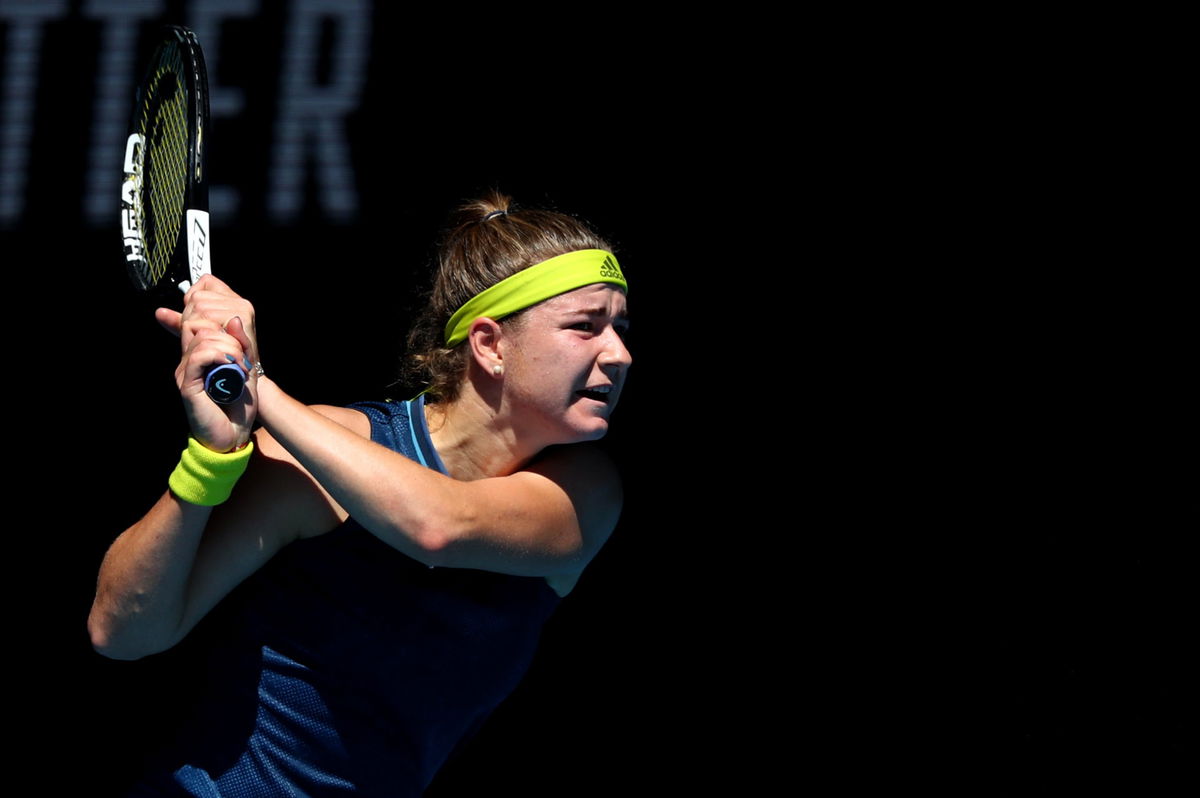
Reuters
Tennis – Australian Open – Melbourne Park, Melbourne, Australia, Czech Republic’s Karolína Muchova in action during her quarter final match against Australia’s Ashleigh Barty REUTERS/Kelly Defina

Reuters
Tennis – Australian Open – Melbourne Park, Melbourne, Australia, Czech Republic’s Karolína Muchova in action during her quarter final match against Australia’s Ashleigh Barty REUTERS/Kelly Defina
“Do you want a player to die on court?” Rune’s plea came as doctors and physios scrambled to keep players upright at the Shanghai Masters. As temperatures soared to 34°C and humidity smothered the courts at 80%, exhaustion painted every rally with pain in conditions bordering on unbearable. The suffering stretched beyond Shanghai, 500 miles away at the Wuhan Open, Emma Raducanu collapsed with dizziness yesterday, and now Karolina Muchova has joined the casualty list, giving up mid-match.
Watch What’s Trending Now!
The Asian swing has become a survival test, where heat, humidity, and human limits clash under a punishing sun. Under the blistering Wuhan heat, Karolina Muchova battled Magdalena Frech on Court Two in the Round of 32. A medical timeout halted play as the physio checked her vitals, with Frech leading 2-1 in the second set.
But the struggle only deepened. After resuming, Muchova’s body gave in to the scorching conditions. Down 1-4, she retired, unable to push further. Unlike her battle with Marta Kostyuk, where she rallied back after dropping the first set, the heat showed no mercy this time, another casualty in the unforgiving Asian swing.
ADVERTISEMENT
Karolina Muchova retired at 1-4 down vs Magdalena Frech in set 2.
Was struggling with the heat just like against Kostyuk and couldn’t continue. https://t.co/LiyVtftO3J pic.twitter.com/EpKODHSnDO
— edgeAI (@edgeAIapp) October 8, 2025
And the story refuses to fade away. On Monday, matches on the outside courts were suspended, and the roof on the main court was closed in desperation. A day later, former French Open champion Jelena Ostapenko retired against Sorana Cirstea, later admitting she had “suffered a heat stroke.”
Back in Shanghai, the chaos was just as relentless. Holger Rune needed medical attention mid-match. His blood pressure was checked, and ice towels were draped over his shoulders. Novak Djokovic called his own third-round battle “brutal,” while Giovanni Mpetshi Perricard said he felt like he was “dying on the court” under the suffocating humidity.
ADVERTISEMENT
Jannik Sinner’s condition painted an even darker picture, barely able to walk as cramps seized him under the floodlights. The Italian’s retirement only underscored how the searing conditions had turned competition into survival. Each rally, each serve, felt like a battle not just against an opponent, but against the elements themselves.
Even those who didn’t finish their matches walked away with scars. Terence Atmane, who retired from his first-round clash on Thursday, took to Instagram to detail his experience: “After the first point of the match both of my hands were shaking.” His words grew heavier, “The heat stress I’ve faced today could have been worse than losing my consciousness for an hour and just rapid heartbeat…”
ADVERTISEMENT
As temperatures soar and humidity tightens its grip, the message from players is clear: something must change. The grind goes on, but the toll is undeniable.
Iga Swiatek critiques the grueling schedule causing player retirements
Iga Swiatek recently tore through Marie Bouzkova 6-1, 6-1, but even in victory, she felt the weight of the season. Reflecting on the punishing conditions, she admitted she was grateful not to have played on Monday, when the heat was, in her words, “too much for most of the players.” Swiatek added, “I hope the other matches will be scheduled at a time where girls can compete, rather than just die on the court,” highlighting the human limits being tested in the Asian swing.
ADVERTISEMENT
Her empathy extends beyond herself. During the China Open, Swiatek advanced to the Round of 16 after Camila Osorio abruptly retired following a medical timeout, sidelined by injury. “For sure, I’m sorry for Camila, because she’s always giving her 100%,” Swiatek said, noting that the Colombian had been struggling from the very start. Even in victory, the shadow of exhaustion and injury looms large.
The season’s grind is relentless. Asked about players like Carlos Alcaraz feeling fatigue late in the calendar, Swiatek offered blunt honesty: “Obviously the season is long. The second part of it I think people are more fatigued. The Asian Swing is the hardest because you feel the finish line coming, but you still have to push.” Every match becomes a test of endurance as players chase glory under punishing conditions.
Top Stories
Madison Keys Shares Cheeky Marriage Confession After Husband’s ‘Thrown Out’ Warning at Australian Open

Roger Federer Breaks Silence on Possible Coaching Role at the Australian Open: “Never Say Never”

WATCH: Novak Djokovic Left Speechless After Roger Federer Chants Echo Through the Crowd

Roger Federer Raises Comeback Hopes After Stunning Casper Ruud at Australian Open

Australian Open Sees Engaged Tennis Couple Celebrate Big Wins With Touching On-Court Moment

At the Wuhan Open, the pattern continues. Bianca Andreescu required a timeout before serving at 5-6 against Anastasia Zakharova, who herself had received treatment earlier. Katerina Siniakova stopped playing at 0-3 down in the second set against Yafan Wang. These are not isolated incidents; they form a worrying trend, a symptom of a calendar pushing athletes past their breaking point.
ADVERTISEMENT
The question remains unresolved: when will the suffering end? Players are pushed to their limits, physically and mentally, as the heat and intensity of the tour collide. For Swiatek and her peers, the grind continues, a reminder that tennis is as much about survival as it is about triumph.
ADVERTISEMENT
ADVERTISEMENT
ADVERTISEMENT

